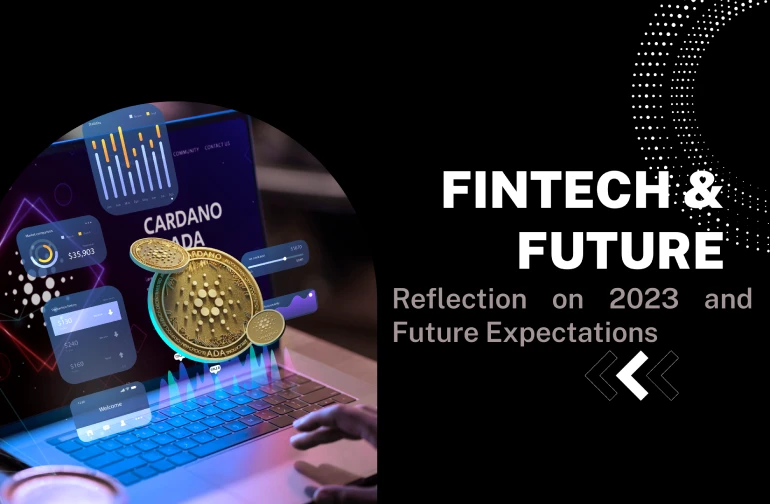The rapidly evolving landscape of financial technology, or FinTech, is all set for remarkable advancements in 2024. Let’s explore the potential impacts of the top FinTech trends 2024 on the industry stemming from shifts in cybersecurity, crypto, AI, open banking, mobile, and well tech as we approach 2024.
Reflection on 2023 and Future Expectations of Fintech Trends 2024
In the retrospective view of 2023, it emerges as the year dominated by generative AI, notably marked by the release of OpenAI’s ChatGPT in November 2022, rapidly becoming the world’s most popular chatbot with a staggering 180 million users.
The Gillmore Centre for Financial Technology conducted research indicating that 93% of fintechs anticipate continued revolutionary impacts from generative AI in the financial services sector. Surveying 250 senior decision-makers at UK financial institutions and banks, the study also found that 91% foresee generative AI playing a pivotal role in driving financial democratization, showing a new era of accessibility and inclusivity.
Another significant development in 2023 was the implementation of the Financial Conduct Authority‘s Consumer Duty in July, marking a substantial shift in regulatory expectations for firms within its scope. This emphasizes a commitment to consumer protection and requires banks to prioritize customer needs and trust-building while also preparing for reporting obligations.
KPMG’s quarterly Global Analysis of FinTech Funding Reports has portrayed a complex funding landscape. Despite challenges such as inflation, rising interest rates, and geopolitical unrest, the Americas saw a surge in fintech funding from $28.9 billion in H2 2022 to $36 billion in H1 2023.
Specific sectors, like logistics and supply chain-focused fintech, reached unprecedented funding heights at $8.2 billion, and ESG-focused fintech secured $1.7 billion, surpassing figures from the entire year of 2022.
While challenges persist, the fintech sector remains resilient. Despite potentially subdued overall fintech activity, payments, insurance tech, and wealth tech are expected to sustain or even accelerate funding. The spotlight on AI is expected to remain bright, indicating its continued relevance in shaping the industry’s trajectory. Delving into the fintech trends 2024, we’ll now explore the trends in Artificial Intelligence (AI) and cybersecurity.
Fintech Trends 2024: A Glimpse into the AI & ML Revolution
As we approach 2024, the trajectory of AI and machine learning in the fintech landscape promises substantial evolution. Experts foresee expanded data utilization, leading to enhanced applications in transportation, self-driving cars, and drones, impacting daily life. GenAI, a pivotal trend, is anticipated to revolutionize tech and society, reducing work hours through conversational AI and coding automation.
In traditional sectors, healthcare may benefit from material informatics for quicker drug discovery, while finance aims at risk avoidance and optimized investment strategies. Meanwhile, manufacturing eyes data utilization for productivity improvements. However, ethical considerations, including discrimination and transparency, will play a central role in AI’s future development.
How will AI and machine learning applications evolve in 2024 for the fintech industry?
The financial services industry is ready for an AI and machine learning revolution in 2024. With GenAI reshaping the “front office,” customer service capabilities are set to soar, offering real-time analysis, compliance monitoring, and privacy-preserving AI-assisted agents. As advanced use cases emerge, ethical concerns about transparency and data protection will gain prominence. The industry aims to harness AI to empower individuals lacking credit ratings and expand global financial inclusion. However, deploying AI in financial decisions necessitates navigating privacy, consent, and ethical standards, prompting the need for robust regional regulations.
According to Yasuhide Matsumoto, Senior Director and Subject Matter Expert (AI) of the Technology Strategy Unit at Fujitsu, advancements will expand data use, particularly in self-driving cars and drones, impacting daily life. The key trend to watch is generative AI (GenAI), which is expected to revolutionize the tech industry and society by reducing work hours through conversational AI and coding automation.
GenAI Revolution in Fintech’s Strategic Decisions
The rise of GenAI has captured global attention, particularly in the banking sector. While concerns about data security persist, banks are actively exploring valuable use cases of GenAI. Pilot studies focus on internal data usage for improved employee productivity, avoiding customer information due to privacy concerns. As GenAI adoption continues, banks face critical decisions on building in-house capabilities, partnering with external providers, or adopting a hybrid strategy. Talent pipelines must prioritize AI skills, and ethics will be paramount in governance frameworks for deploying GenAI and large language models in the evolving fintech landscape 2024.
Ville Sointu, Head of Solutions & Strategy for Mobile Financial Services at Ericsson, anticipates AI refining financial services and enhancing customer service agents with real-time analysis and compliance monitoring. However, ethical considerations will arise in addressing transparency and data privacy.
Fintech Trends 2024: Anticipated Rise in Scrutiny for Third-Party Tracking Pixels and Other Technologies
Businesses frequently employ third-party tracking pixels, cookies, and software development kits (SDKs) to monitor user activities and deliver personalized advertising. However, the increasing regulatory focus on these practices, particularly concerning sensitive personal data, raises questions about consumer awareness and consent.
In 2024, all eyes, from end users to providers, will be on the forefront of cybersecurity. The surge in digital payments, coupled with the rapid integration of AI and cutting-edge technologies, amplifies the risk of fraud. Global leaders have already voiced concerns over AI-driven cyber threats, leading to calls for robust mitigation strategies against advanced persistent threats (APTs). As technology advances, cybersecurity is set to take center stage, driving a more vigorous push for global cooperative frameworks. These frameworks aim to mitigate risks, fostering a transparent, trusted, and accountable financial landscape.
Can we expect a heightened focus on cybersecurity in 2024?
2024 will witness a heightened focus on cybersecurity in the fintech landscape. The surge in digital payments and the integration of AI technologies bring increased risks, prompting global leaders to call for robust mitigation strategies. The financial industry must prioritize cybersecurity as technology advances to ensure a transparent, trusted, and accountable environment.
How will financial institutions navigate the pressure to adopt digital technologies while ensuring cybersecurity in 2024?
Financial institutions face mounting pressure to embrace digital technologies driven by consumer preferences and evolving competitive landscapes. As customers demand seamless mobile and online experiences, new fintech disruptors emerge with digital-first offerings. However, this digital transformation increases the need for a strategic approach to cybersecurity. According to IBM, data breaches and fraud could incur costs exceeding $4 million per incident, risking trust and reputation. As banks reshape operations, finding the right balance between security and user experience becomes paramount.
Financial institutions, driven by consumer demands and fintech competition, are undergoing digital transformations. However, this shift necessitates a strategic focus on cybersecurity to mitigate risks. Balancing the seamless user experience with robust security measures is crucial for banks in 2024.
Let’s Wrap It Up!
The fintech trends 2024 promise an exciting journey with the convergence of AI and cybersecurity in the digital finance landscape. As financial institutions navigate the dynamic shifts in technology and consumer expectations, the spotlight on cybersecurity becomes more pronounced. The evolving role of AI, especially generative AI, hints at transformative possibilities in various sectors, while ethical considerations remain paramount. As we enter this future, collaboration, innovation, and robust cybersecurity measures will shape the financial services landscape, ensuring a secure, seamless, and trusted experience for all stakeholders.
Discover the Top 10 groundbreaking technology trends for 2024.







